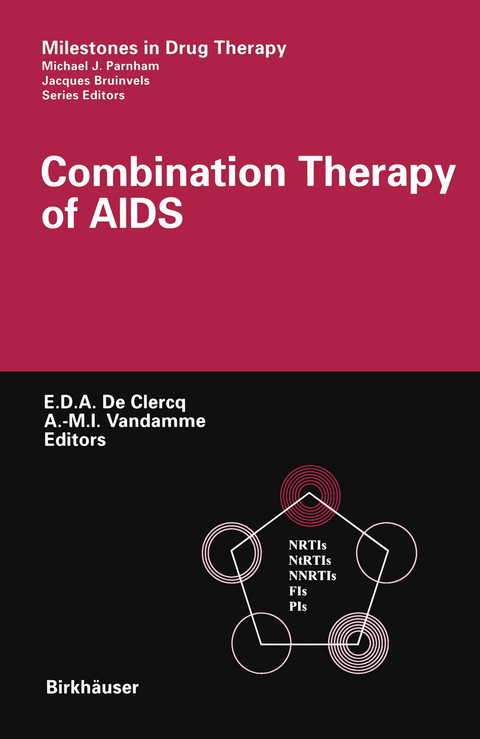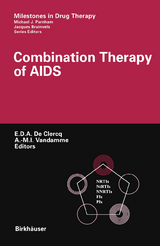Combination Therapy of AIDS
Seiten
2003
|
2004
Springer Basel (Verlag)
978-3-7643-6600-1 (ISBN)
Springer Basel (Verlag)
978-3-7643-6600-1 (ISBN)
HIV infection has been a greater challenge to current medicine than any other viral disease ofmodem times. HIV leads to a persistent infection and the virus has an immense genetic flexibility under selective pressure. During its replica tive cycle in patients, HIV accumulates mutations at such a high rate that the selective pressure inflicted on the immune system, or generated by antiviral drugs rapidly triggers the appearance of escape mutants. Currently available drugs, when used singly, are not capable of suppressing virus replication in patients to such a level that the generation of mutations, from which a variant resistant to immune attack or antiviral drugs can be selected, is prevented. This is the main reason why combination therapy, usually of three drugs, has become the standard procedure for the treatment ofAIDS. It is obvious that virus eradication will not readily be achievable, so that drugs have to be taken for a prolonged time or even lifelong so as to keep the viral load as low as possible. Whether the currently used drug combinations will be able to control virus replication in a particular patient for such a pro longed period of time depends on many factors, most of which are addressed in the different chapters of this book. The aim of antiviral drug combination therapy for AIDS is ultimately to restore full function of the immune system.
Anti-HIV agents to be used in combination drug regimens.- A perspective of the history of HAART.- The basic principles for combination therapy.- Comparison of the efficacy of HAART: single, dual or triple-class antiretroviral therapy.- Primary HIV infection: From diagnosis to treatment.- Salvage therapy.- Structured therapy interruptions (STIs): Lessons from a therapeutic strategy.- Immune reconstitution in HIV infection.- Highly active antiretroviral treatment (HAART) of pediatric HIV-1 infection.- Causes of HIV treatment failure.- Economic implication of HIV-1 resistance testing in overall clinical care.- Guidelines for antiretroviral therapy
| Erscheint lt. Verlag | 27.11.2003 |
|---|---|
| Reihe/Serie | Milestones in Drug Therapy |
| Zusatzinfo | XI, 243 p. |
| Verlagsort | Basel |
| Sprache | englisch |
| Maße | 155 x 235 mm |
| Gewicht | 710 g |
| Themenwelt | Medizin / Pharmazie ► Medizinische Fachgebiete ► Pharmakologie / Pharmakotherapie |
| Medizin / Pharmazie ► Pharmazie | |
| Schlagworte | AIDS • Assessment • basics and guidelines • cost effectiveness • Diagnosis • Drug • drug interactions • HAARTS (Highly Active Antiretroviral Therapies) • HIV • HIV Infection • immunology • Infection • Infectious Diseases • Pharmacodynamics • Pharmacokinetics • pharmacology • Public Health • Research • resistance • therapy |
| ISBN-10 | 3-7643-6600-1 / 3764366001 |
| ISBN-13 | 978-3-7643-6600-1 / 9783764366001 |
| Zustand | Neuware |
| Haben Sie eine Frage zum Produkt? |
Mehr entdecken
aus dem Bereich
aus dem Bereich
Arzneimittelverzeichnis für Deutschland (einschließlich …
Buch | Hardcover (2024)
Rote Liste Service GmbH (Verlag)
CHF 149,95
Englisch für Apotheker und PTAs
Buch | Spiralbindung (2024)
Kohlhammer (Verlag)
CHF 44,75




